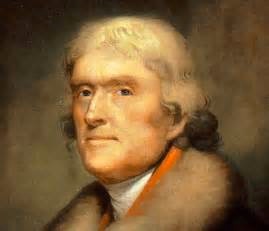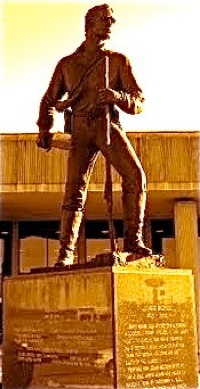Double Vision
Jay Brakefield
ellum1@aol.com
Like Yossarian, the anti-hero of Joseph Heller’s classic
Catch-22, I see everything twice. I have a condition called diplopia, also known as lazy eye.
When he voiced his condition, Yossarian was trying to get out of taking part in more World War II bombing missions. I was taking my military physical, figuring I’d get it out of the way before finishing college or getting killed, in which I wouldn’t need a degree. I wouldn’t have run off to Canada, but I wasn’t sad to be rejected. Nothing I’ve learned in the ensuing years has made me think that not going to Vietnam was a bad thing.
Recently, I did a radio interview with a well-known war correspondent about his experience in Vietnam. He derided as cowards those who chose not to serve. He also said that the war was stupid and unnecessary. In fact, he said that all our wars, with the possible exception of World War II, were stupid and unnecessary. He seemed to be saying that we have a patriotic duty to serve in any cockamamie conflict our leaders get us into. A Frank Zappa line floated into my consciousness: “Be a loyal plastic robot for a world that doesn’t care.” I didn’t challenge the writer. He’s a nice guy who still tears up when he talks about holding young soldiers in his arms and trying to comfort them as they died. To quote another rock lyric, let it be.
I’ve long since learned to live with the eye condition, the presence of a kind of ghost image, courtesy of my weak left eye. And I’ve come to think of my odd, pesky little visual handicap as a metaphor for the duality at the heart of our human existence. As one of my sons said at an early age, “There’s part of me that wants to be bad.” We’ve probably all had family members who were warm, wonderful people except as regards another group of fellow humans, whether it be African Americans, Jews or some other subset of our species. A former relative by marriage railed against Hungarians. Go figure.
A lot of American history doesn’t get taught in school, and sometimes when people learn the back stories on fabled people and events, they get upset. We’re taking down statues of historical figures such as Robert E. Lee because they owned slaves and, in many cases, served in the Lost Cause to preserve that horrid institution. I understand the

urge to do this, but where does it stop? Our long-revered third president, Thomas Jefferson, opposed slavery until he realized how profitable it was. He made a lot of money from the nails that slaves fashioned by hand, which was tough, exacting work. He hid the slave quarters and the nail shop behind groves of trees and had slaves hidden in the basement send up bottles of wine via a dumbwaiter designed by the master himself. Jefferson fathered children with a slave, Sally Hemmings, who was also his wife’s half-sister. (Wouldn’t you love to have been a fly on the wall in that household?) A newspaper colleague said that when he was growing up in D.C., whenever he and his friends spied a light-skinned African American with freckles and reddish hair, someone would quip, “Must be one of them Jeffersonians.”
Do we raze the Jefferson Memorial? What about all those schools named after James Bowie, an Alamo hero who made a lot of money as a slave trader? The removal of Lee’s statute in New Orleans got some folks mighty upset. After that, protesters,
some carrying Texas and Confederate flags and guns, gathered in Houston’s Hermann Park after they heard that a group wanted to take down the statue of ol’ Sam himself that’s stood in the park since 1925. (He, too, owned slaves, but refused to endorse secession from the Union.) No representatives of the possibly nonexistent anti-Sam group showed up, but people still hurled insults at one another and someone posted a video of an alt-right guy being choked.
A retired black teacher once told me that international travel had put our American racism in perspective for him. People everywhere find ways to designate others as “the other,” on the basis of race, sex, religion or, as in the case of Somalia, clan lines. This has always been a violently fractious nation in a violently fractious world. We have truly met the enemy, and he is us.
This country has an overwhelmingly binary culture, regarding the dark side as something to be hidden or destroyed—or put to use in a good cause, such as invading Vietnam or Iraq or Afghanistan.
Other peoples have a different vision, in which both forces are both necessary and must remain in balance. I love Stephen Mitchell’s translation of the classic text
Tao te Ching. The author, called Lao Tsu, taught that the wise accomplish a lot without seeming to do much, because they’re in tune with the tao, the way, while the foolish do much and accomplish little.
Can that kind of calm wisdom ever prevail, or will we always be at war within ourselves? Maybe there’s a certain beauty in that struggle. It has certainly produced a lot of great art and literature. As Dylan Thomas wrote in the poem about the boys of summer, “O see the poles are kissing as they cross.”
enough









